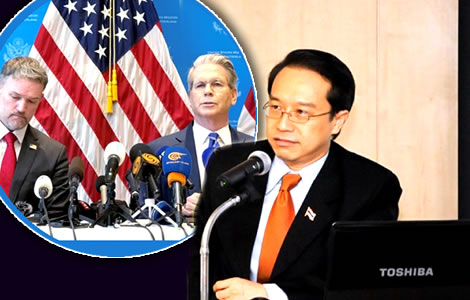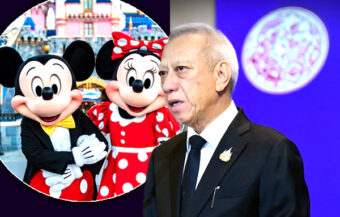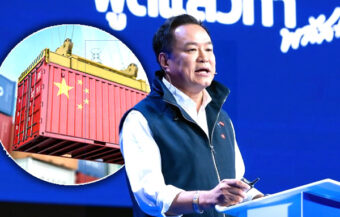Top Thai economist warns the country faces severe economic fallout unless urgent trade talks with the US begin. As China secures a 90-day tariff cut, Thailand risks a 36% export tax, missed growth targets and falling behind Vietnam without swift action.
One of Thailand’s top economists on Monday urged Prime Minister Paetongtarn Shinawatra’s government to act swiftly on trade talks concerning US tariffs. The call came after US and Chinese negotiators reached a temporary agreement to ease trade tensions. Under the deal, US tariffs on China have been reduced to 30% for the interim period. In contrast, Thailand faces a proposed 36% tariff on its exports starting July 8—posing a serious threat to the country’s economy. Dr Anusorn Thamjai warned that without urgent action, Thailand could face severe consequences. He called for immediate negotiations to prevent long-term damage.

Dr Anusorn also highlighted growing public scepticism about the government’s ability to handle the situation. A recent poll revealed that 76% of Thais believe the administration is incapable of managing the tariff crisis effectively. Without decisive leadership, Thailand risks missing its already modest growth target of 2% this year.
The warning comes amid increasing pressure from regional competitors such as Vietnam, which continues to outpace Thailand in economic growth and trade resilience.
Global trade tensions eased on Monday after the United States and China reached a temporary deal to slash tariffs. The agreement, effective for 90 days, reduces US tariffs on Chinese goods to 30%, down from 145%.
US-China tariff truce gives global markets a brief reprieve but leaves Thailand exposed without fast action
In return, China will cut its tariffs on American goods to 10%. According to Thai economist Dr Anusorn Thamjai, this development is a much-needed relief for the world economy.
Dr Anusorn is Dean of Economics and Director of the Center for Research on Digital Economy, Investment and International Trade at the University of the Thai Chamber of Commerce. He said on Monday that the agreement signals a potential turning point in the global trade system. “Trade between China and the US can now return to near-normal conditions,” he said. “This should help balance the US trade deficit with China.”
Significantly, Anusorn warned that Thailand must act fast. If the Thai government fails to negotiate lower tariff rates, the economy could suffer. “If we’re taxed at 36%, Thai products can’t compete with Chinese ones,” he warned. “In that case, our GDP growth may fall below 2%.”
The latest deal may ease pressure on US consumers, especially regarding inflation and the cost of living. Shortages of goods in American markets should also improve. Multinational supply chains, severely disrupted over recent years, are expected to stabilise. As a result, global economic growth may now trend upward, defying earlier forecasts.
Experts warn Thai export outlook weakens further without deal to slash damaging 36% US tariff rate
Moreover, major international institutions back these views. Research from the IMF, WTO and World Bank supports the idea that tariff hikes hurt global growth.
According to their findings, raising tariffs disrupts employment, weakens productivity, and damages value creation across sectors. It also misallocates global resources and reduces overall social welfare. The latest tariff cut, they argue, helps restore economic efficiency and may slow inflation, especially in the US.
Nevertheless, the truce is temporary. Tariff levels may rise again after 90 days. “It remains to be seen whether these rates hold,” said Anusorn. “If they stay between 10% and 30%, the damage will be limited.”
Meanwhile, Thailand’s economic future remains uncertain. Anusorn stressed that proactive negotiations are crucial in the weeks ahead. “We must push to reduce the 36% US tariff on Thai goods to under 30%,” he said. “If we succeed in cutting it to 10–15%, our exports will remain competitive.”
However, failure to secure this deal could spell trouble. If tariffs remain high, Thai exports may decline in the second half of 2025. Consequently, GDP could shrink compared to the first half. “We may see a contraction in both growth and exports,” Anusorn warned.
Urgency grows for Thailand to reach US deal as experts predict second-half contraction without progress
Thailand’s situation is further complicated by internal political risks. Negotiations require stability, but uncertainty looms. “If the government changes or the negotiation team is replaced, it will delay talks,” said Anusorn. “Other Asian countries may start talks before us. That puts Thailand at a disadvantage.”
For instance, Vietnam hopes to have a trade deal with US negotiators concluded by June 18. Furthermore, the Southeast Asian country is still targeting growth of 8% this year. At this rate, it is now on course to overtake the Thai economy in the next two to three years. It would consequently become Southeast Asia’s second-largest economy instead of Thailand.
Furthermore, public trust in government efforts is low. A recent poll found that 76% of Thais do not believe the current administration can resolve the “Trump tax” issue. That lack of confidence could undermine domestic support for policy responses.
The broader regional impact is already being felt. The National Economic and Social Development Board (NESDB) recently slashed Thailand’s 2025 GDP forecast. It now expects growth of just 2.0% to 2.2%. Export growth has also been downgraded to a meagre 0.3%–0.9%. These cuts reflect ongoing global uncertainty and weak domestic confidence.
Regional rivals surge ahead as Thai outlook dims and confidence in government’s strategy collapses
Companies are also reacting. Industrial estate developer Amata has urged Thai businesses to adapt quickly. The firm advised entrepreneurs to rethink dependence on “giant country” models and focus on more flexible strategies. It also recommended a move away from over-reliance on major powers like the US and China.
There is, however, some optimism in financial markets. Anusorn predicted that investor sentiment will shift toward riskier assets in the months ahead. “We’ll likely see a strong rebound in stock markets,” he said. “Investors may pull back from cash and gold.”
Nevertheless, he cautioned that the gold price could drop, though not yet enter a sustained downtrend. “Gold may fall,” he said, “but the trade war isn’t over, and risks remain.” Confidence in the US dollar and Treasury bonds is still uncertain. Meanwhile, geopolitical tensions could continue to rattle markets.
Thailand’s future, then, rests on two pillars: successful tariff negotiations and political stability. Without these, the country risks falling behind its regional peers. In contrast, timely action could safeguard its export sector and support growth above 2%.
Thai firms urged to rethink global trade model as investors eye stock rally despite looming uncertainty
For now, the US-China tariff deal has injected some short-term optimism into the global economy. The 115% cut in import duties is a positive step, but the road ahead remains precarious. Whether Thailand can navigate the challenge depends on swift, strategic diplomacy and a steady hand at home.
Nevertheless, the Thai government’s negotiation process presently appears stalled. Over the weekend, an appellate court denied permission for former Prime Minister Thaksin Shinawatra to travel to Qatar.
Previously, on Thursday, the court had ruled it was a personal visit. Thaksin is at this time charged with an Article 112 lèse-majesté offence. He was granted bail last year.
Hopes fade for trade progress as Thai talks stall and Thaksin is blocked from travel to Qatar
On Thursday, Minister of Foreign Affairs Maris Sangiampongsa was in court to support the petition. In addition, the ministry filed documents along with the required request. Sources close to Mr Thaksin on Sunday suggested the bar on his visit was a lost opportunity for the kingdom.
Prime Minister Paetongtarn visits Vietnam this week as Hanoi readies to surpass Thailand’s ailing economy
Thaksin denied court permission to fly to Qatar where he had hoped to meet US President Donald Trump
Thailand’s obscure negotiation strategy with United States an outlier as PM promises a ‘secret deal’
Previously, Prime Minister Paetongtarn Shinawatra had spoken of a ‘secret deal’ between Thailand and the United States. This has fuelled speculation that there is some hindrance to talks, which were also previously linked to the lèse-majesté case involving US professor Paul Chambers. That case was subsequently dropped.
However, Thailand’s negotiating team has not yet set another date for talks. The talks were cancelled by Thailand on April 23rd for the second time.
Join the Thai News forum, follow Thai Examiner on Facebook here
Receive all our stories as they come out on Telegram here
Follow Thai Examiner here
Further reading:
Thaksin does not rule out joining talks in US as Thai team finalises plans. They fly out on Thursday


















